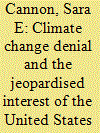| Srl | Item |
| 1 |
ID:
180647


|
|
|
|
|
| Summary/Abstract |
The Compacts of Free Association (COFA) are agreements between the United States of America and three Pacific Island countries: the Republic of the Marshall Islands (RMI), the Federated States of Micronesia (FSM) and Palau, collectively the Freely Associated States (FAS). COFA provides the FAS financial assistance to build their economies and foster financial independence; in exchange, the United States has regional military control. The United States is the world's second largest emitter of greenhouse gases, while the FAS produce few emissions but are vulnerable to climate impacts. I highlight inconsistencies in U.S. policies from within its own paradigm by ‘seeing like an empire’ to show how contradicting priorities jeopardise American interests in the region. Aid provided by COFA has done little to build infrastructure supporting the FAS's economically independence, and climate change diverts economic resources to funding climate adaptation. The United States is currently battling China to maintain hegemony in the Pacific, making the FAS strategically important for national security. Meanwhile, climate change threatens U.S. military installations in the FAS. It is in the United States' best interests to limit emissions to protect its investments in the FAS, but this requires a policy change to prioritise its commitments in Micronesia over climate change denial.
|
|
|
|
|
|
|
|
|
|
|
|
|
|
|
|
| 2 |
ID:
092973


|
|
|
|
|
| Publication |
2009.
|
| Summary/Abstract |
The Republic of Kiribati is a small, highly infertile Pacific Island nation and is one of the most challenging locations to attempt to support dense urban populations. Kiribati, like other nations in the Pacific, faces an urban future where food insecurity, unemployment, waste management and malnutrition will become increasing issues. Homegardening is suggested as one way to address many of these problems. However, the most recent study on agriculture production in urban centres in Kiribati shows that, in general, intensive cultivation of homegardens is not a common practice. This disparity between theory and practice creates an opportunity to re-examine homegardening in Kiribati and, more broadly, in the Pacific. This paper examines the practice of homegardening in urban centres in Kiribati and explores reasons why change has or has not occurred through interviews with homegardeners and government/donor representatives. Results show that homegardening has increased significantly in the past five years, largely because of the promotion of homegardens and organic composting systems by donor organisations. While findings further endorse homegardening as an excellent theoretical solution to many of the problems that confront urban settlements in Kiribati and the Pacific, it raises additional questions regarding the continuation of homegarden schemes beyond donor support programmes.
|
|
|
|
|
|
|
|
|
|
|
|
|
|
|
|
| 3 |
ID:
128897


|
|
|